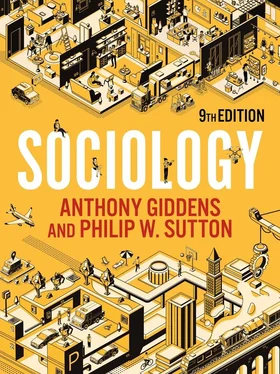Similarly, sociologists may begin with a problem to which many people think they already know the answer. Is crime really getting worse? Why are boys underachieving in secondary school? Why do women still do more housework than men? In addressing such questions, sociologists are never content with anecdotal evidence, personal beliefs, newspaper stories or television news reports. They always employ research methods to collect evidence, which they then analyse and interpret using theoretical ideas to generate a deeper understanding of the phenomena under study. In this way sociology often challenges the ‘obvious’ or simple answers and sets our local knowledge within a much wider frame of reference, most recently the global level of social interactions.
Sociological research is rarely of interest only to the community of sociologists. A good proportion of research funding comes from government sources and is directly linked to social issues and problems. Many studies of crime and deviance, for example, target specific offences or types of offender with a view to gaining better understanding so that the problems associated with crime can be tackled more effectively. Sociologists also work with voluntary agencies, public bodies and businesses, bringing their research skills to bear on questions set by the former. Much of this is applied social research, which does not simply endeavour to produce better knowledge but also seeks to inform interventions aimed at improving some aspect of social life. Researchers studying the effects on children of parental alcohol use, for instance, may be interested in whether a particular treatment programme has any effect on reducing alcohol abuse.
The findings from sociological research are also disseminated throughout society. Sociology, it must be emphasized, is not just the study of societies; it is a significant element in the continuing life of societies. Consider the transformations taking place in relation to marriage, sexuality and the family (discussed in chapters 7, 14and 15). Most people have some knowledge of these as a result of the filtering down into society of social scientific research findings. Our thinking and behaviour are thus affected by sociological knowledge in complex and often subtle ways. However, as our behaviour changes, so does society – the very subject of sociological investigation. A way of describing this two-way phenomenon, using our technical language, is to say that sociology stands in a ‘reflexive relation’ to the human beings whose behaviour it studies. Reflexivity, as we shall see in chapter 3, describes the interchange between sociology and social life. We should not be surprised that sociological findings often correlate closely with common sense. But this is not because sociology tells us what we know already. Rather, sociological research helps to shape our common-sense knowledge of society in the first place, even though we may not immediately realize it.
 Chapter review
Chapter review
1 What research methods were used in Humphreys’ research study Tearoom Trade (1970)? Why was this project considered ‘controversial’?
2 Are any of these subjects effectively ‘off-limits’ to sociologists?gender differences in the membership and use of dating appsthe voting intentions of newly eligible voters aged eighteen to nineteenthe extent of elder abuse in care homes.
3 Explain what is meant by each of these: comparative research, developmental research and applied social research.
4 List some ethical issues that sociological researchers need to consider. How are these different to those that face natural scientists?
5 ‘Is sociology a scientific discipline?’ Choose TWO philosophers of science and outline how they answered this question.
6 What is the difference between a correlation and a cause? Provide one example of a genuine causal relationship.
7 ‘Quantitative research can be scientific, qualitative research cannot.’ Explain why this statement is not correct.
8 Give ONE real-world example of an appropriate subject for each of the following methods: ethnography, biographical methods, visual sociology, survey research, historical research.
9 Devise a research strategy involving TWO research methods to investigate the following subjects. What ethical and practical problems do you foresee and how would you overcome them?domestic violence within female same-sex relationshipsthe extent of self-harming behaviour among schoolchildren aged eleven to sixteenthe coping strategies adopted by ‘lifers’ in male prisons.
10 What is meant by digital sociology? What kinds of digital data can be useful for sociologists?
 Research in practice
Research in practice
Most sociology graduates will know of the classic studies of the discipline. But sociology exists in its ongoing research programmes and studies, most of which are published in a range of academic journals. Journal articles (called ‘papers’) are part of the continuing process of data collection, theory building and extending our stock of knowledge.
Anthropologists and sociological ethnographers have long been aware of the dangers of getting too close to their subjects during the research process, which may threaten their objectivity and compromise their findings. But is this caution really justified? Is it possible that researchers and their subjects may develop friendships that, rather than compromising their research, may actually be beneficial to it?
The paper below explores this issue of personal relationships in auto/biographical research. Read the piece and tackle the questions that follow.
O’Donoghue, C. T. (2014) ‘Friendship in the Field: Ethics and Reflexivity in Auto/biographical Research’, Journal of Postgraduate Research [Trinity College Dublin]: 177–91; www.tara.tcd.ie/handle/2262/73634.
1 What is the main issue which this paper attempts to tackle?
2 How was the sample for the paper gathered?
3 What advantages are claimed for the ‘life history’ method over other research methods?
4 How did the researcher try to keep the ‘researcher-as-friend’ out of the research process? From evidence in the paper, how successful was this strategy?
5 What is meant by ‘the vulnerable observer’?
6 ‘The research participants were aware of the impact that these narratives were having on me, and that I was more than a “mere note-taker”….’ Is there any evidence that this may have had a negative influence on the research?
 Thinking it through
Thinking it through
Sociological research usually starts with a problem or question, and the project involves several stages. Design your own small-scale project adopting the first four stages of the process (refer back to figure 2.1).
Select a subject of interest, then narrow this down to a specific research question.
Identify some key words on the subject and carry out a library search of the relevant literature using those words. Note the ten closest matches.
Consult the first three of these to help construct a hypothesis for your project. What do you actually want to find out?
Now think about exactly how you would carry out the research. Which method or methods are most likely to provide an answer? Should you use more than one method?
Finally, what obstacles do you foresee when the research gets under way and how might you overcome them?
Читать дальше

 Chapter review
Chapter review Research in practice
Research in practice Thinking it through
Thinking it through










